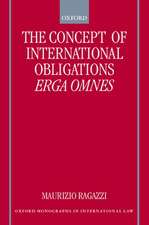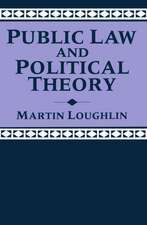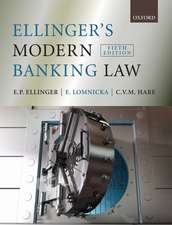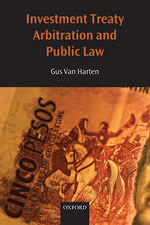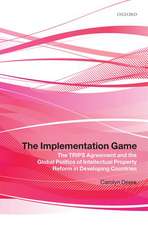Russian Approaches to International Law
Autor Lauri Mälksooen Limba Engleză Hardback – 4 mar 2015
| Toate formatele și edițiile | Preț | Express |
|---|---|---|
| Paperback (1) | 325.59 lei 32-37 zile | |
| OUP OXFORD – 23 mar 2017 | 325.59 lei 32-37 zile | |
| Hardback (1) | 744.58 lei 11-16 zile | |
| OUP OXFORD – 4 mar 2015 | 744.58 lei 11-16 zile |
Preț: 744.58 lei
Preț vechi: 1006.99 lei
-26% Nou
Puncte Express: 1117
Preț estimativ în valută:
142.48€ • 152.36$ • 118.79£
142.48€ • 152.36$ • 118.79£
Carte disponibilă
Livrare economică 17-22 martie
Preluare comenzi: 021 569.72.76
Specificații
ISBN-13: 9780198723042
ISBN-10: 0198723040
Pagini: 240
Dimensiuni: 163 x 240 x 20 mm
Greutate: 0.52 kg
Editura: OUP OXFORD
Colecția OUP Oxford
Locul publicării:Oxford, United Kingdom
ISBN-10: 0198723040
Pagini: 240
Dimensiuni: 163 x 240 x 20 mm
Greutate: 0.52 kg
Editura: OUP OXFORD
Colecția OUP Oxford
Locul publicării:Oxford, United Kingdom
Recenzii
The questions Lauri Mälksoo raises in his book are interesting and important to the members of Russian and non-Russian academic community alike. Hopefully, more research projects will emerge as a result, with this book as a starting point for a fruitful debate not only among legal scholars, but among historians, political scientists, sociologists and representatives of other disciplines as well.
Lauri Mälksoo's study is very critical and open; it shows and explains differences and provides interesting insights into the most recent developments in Russian practice and thinking. His concise and well-written book fills an important lacuna in the meta-analysis of present-day international law doctrine. As he takes Russian international law seriously, his analysis has to be taken seriously as well. It can serve as a starting point for further debate.
Mälksoo has achieved a similar feat of success to that of what Martens did for Tsarist Russian international law - exposing it to the world.
Mälksoo has made a worthy contribution to comparative international law and to our understanding of our Russian colleagues.
For any reader with the slightest interest in the role the Russian Federation plays in the contemporary development of international law, this book is a treasure house of engaged argumentation and extraordinary erudition. Mälksoo has an unrivalled knowledge of the Russian language scholarly literature, much of which is unknown outside the Russian-speaking world. The book is resolutely up to date and starts and finishes in the present day.
Mälksoo's book represents an important and intelligent contribution to the further development of the field of international law, in particular comparative international law, as well as, among other things, the underdeveloped discussion on the connection between the reception of international law and the state of domestic law. In conclusion, the book and what it represents deserves our attention.
Lauri Mälksoo shall be praised for this book. It is the result of a thoughtful research which will serve as a perfect starting point for anyone who wants to understand Russia in terms of international law. The book is also essential for Russian legal scholars, providing them with respectful but critical reflections.
This analysis of Russian scholarship of international law is an invaluable guide for those who write about Russian international policies and the intellectual backgrounds behind these policies.
Lauri Mälksoo's study is very critical and open; it shows and explains differences and provides interesting insights into the most recent developments in Russian practice and thinking. His concise and well-written book fills an important lacuna in the meta-analysis of present-day international law doctrine. As he takes Russian international law seriously, his analysis has to be taken seriously as well. It can serve as a starting point for further debate.
Mälksoo has achieved a similar feat of success to that of what Martens did for Tsarist Russian international law - exposing it to the world.
Mälksoo has made a worthy contribution to comparative international law and to our understanding of our Russian colleagues.
For any reader with the slightest interest in the role the Russian Federation plays in the contemporary development of international law, this book is a treasure house of engaged argumentation and extraordinary erudition. Mälksoo has an unrivalled knowledge of the Russian language scholarly literature, much of which is unknown outside the Russian-speaking world. The book is resolutely up to date and starts and finishes in the present day.
Mälksoo's book represents an important and intelligent contribution to the further development of the field of international law, in particular comparative international law, as well as, among other things, the underdeveloped discussion on the connection between the reception of international law and the state of domestic law. In conclusion, the book and what it represents deserves our attention.
Lauri Mälksoo shall be praised for this book. It is the result of a thoughtful research which will serve as a perfect starting point for anyone who wants to understand Russia in terms of international law. The book is also essential for Russian legal scholars, providing them with respectful but critical reflections.
This analysis of Russian scholarship of international law is an invaluable guide for those who write about Russian international policies and the intellectual backgrounds behind these policies.
Notă biografică
Lauri Mälksoo is Professor of International Law at the University of Tartu in Estonia and the Director of the Estonian Foreign Policy Institute, a think tank in Tallinn. In 2013, he was elected member of the Estonian Academy of Sciences and is currently the Society's youngest member.

